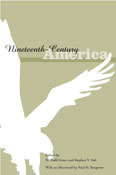Nineteenth-Century America
Essays in Honor of Paul H. Bergeron

- Author(s): Groce, W. Todd, and Stephen V. Ash, eds.
- Series:
- Imprint: Univ Tennessee Press
- Publication Date: 2005-11-15
- Status: Active
- Available in Hardcover - Cloth: Price $40.00 | Buy Now
Paul H. Bergeron joined the University of Tennessee History Department in 1972 and retired three decades later, widely recognized as one of our country’s premier scholars of nineteenth-century political history. In addition to his meticulous scholarship—his career included editorship of both the Correspondence of James K. Polk and the Papers of Andrew Johnson—Bergeron was an esteemed teacher and mentor, celebrated by students and colleagues alike for his wisdom, graciousness, and humor.While at UT, Bergeron directed eleven master’s theses and twelve PhD dissertations, not to mention advising three non-thesis master’s students and serving as a committee member for five other master’s theses and twenty-two other PhD dissertations—a record unrivaled in the annals of the department.
A testament to Bergeron’s enduring impact as a mentor, Nineteenth-Century America gathers original historical essays by seven scholars, all formerly doctoral students under Bergeron’s direction. The essays, though topically broad in scope, all adhere to Bergeron’s rigorous and time-honored standards for research—traditions that have faced intellectual challenges over the years but have never gone out of fashion. Subjects addressed include the Sabbath controversy in the upper South; the intriguing story of how a Union army map maker’s illustrated diary/memoir was found, acquired, and published; and Andrew Johnson’s role in the pardoning of defeated former Rebels after the Civil War.
Despite the variety of the collection, many of the essays deal in some way with politics, political institutions, or public life—all key concerns of Bergeron’s scholarship.Bergeron himself provides the book’s afterword, reflecting on his long career of study and leadership in the field of antebellum political history—a field, as Bergeron himself admits, that is receiving less and less attention among modern historians. There is reason here to rejoice, however, as Nineteenth-Century America shows the period to be of continuing interest, and Bergeron’s influence, enduring.
